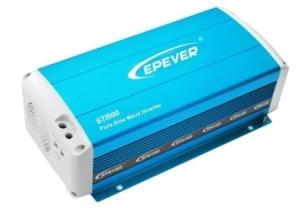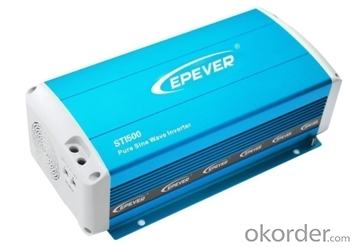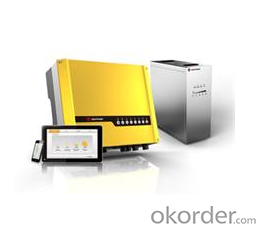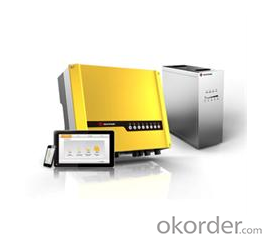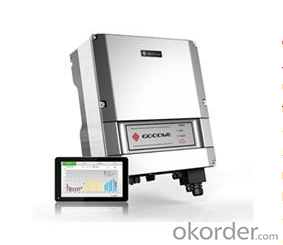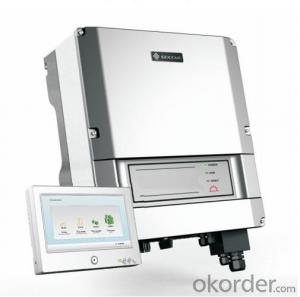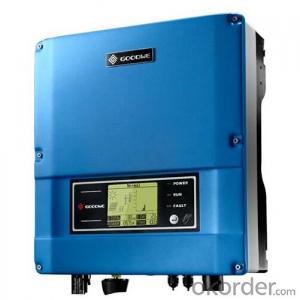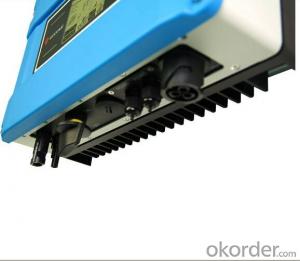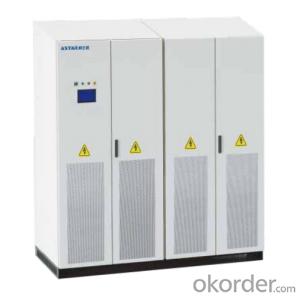Rssi Solar Inverter GW5048D-ES / GW3648D-ES
- Loading Port:
- Shanghai
- Payment Terms:
- TT or LC
- Min Order Qty:
- 10 unit
- Supply Capability:
- 100 unit/month
OKorder Service Pledge
OKorder Financial Service
You Might Also Like
Decription:
GoodWe ES series bidirectional energy-storage inverter is applicable for both on-grid and off-grid PV systems and can control the flow of energy hybrid with its working situation able to be switched automatically or manually. During the day time, the PV plant generates electricity which can be provided to the loads, fed into the grids or charged the battery. The power stored can be released when the loads require it during the night. Additionally, power grid can also charge the storage devices via the inverter.
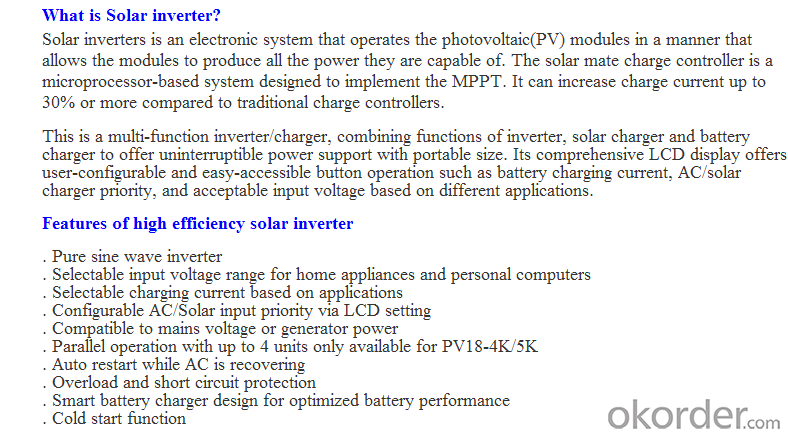
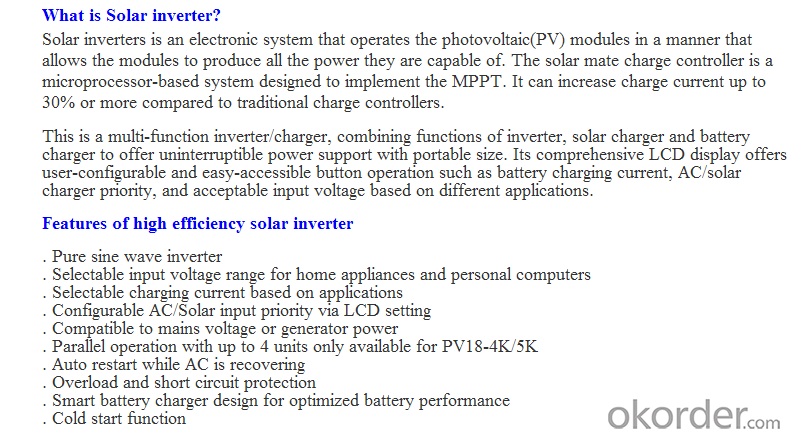
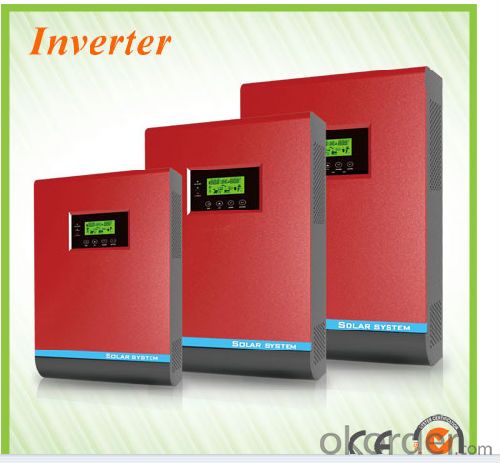
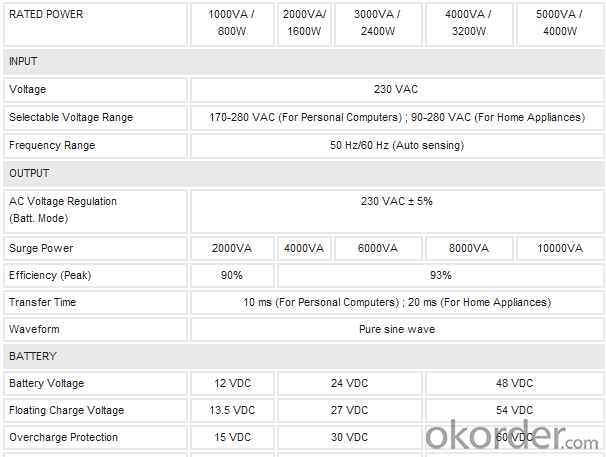
FAQ:What about your warranty?
Our warranty is 1 year
- Q: Can a solar inverter be used in a solar-powered street lighting system?
- Yes, a solar inverter can be used in a solar-powered street lighting system. The solar inverter is responsible for converting the direct current (DC) power generated by the solar panels into alternating current (AC) power, which is required for the operation of street lights. Therefore, it plays a crucial role in ensuring the efficient and reliable functioning of a solar-powered street lighting system.
- Q: What is the difference between low voltage grid connection and medium voltage grid connection?
- When the power grid failure or disturbance caused by the power supply and network voltage drop, in the voltage drop range, the power group can be uninterrupted through the inverter and network operation.
- Q: Can a solar inverter be used with different types of grid connection standards?
- Yes, a solar inverter can be used with different types of grid connection standards. Solar inverters are designed to convert the direct current (DC) produced by solar panels into alternating current (AC) that is compatible with the electrical grid. They are versatile and can be programmed to work with various grid connection standards, such as single-phase or three-phase systems, different voltage levels, and frequency requirements. This allows solar inverters to be used in a wide range of grid configurations, making them adaptable to different regions and grid infrastructure.
- Q: Are there any government incentives for installing solar inverters?
- Yes, there are government incentives available for installing solar inverters. These incentives vary by country and region, but they often include tax credits, grants, or rebates to encourage the adoption of solar energy. Additionally, some governments may offer net metering programs, which allow homeowners to sell excess electricity generated by their solar inverters back to the grid. It is important to research the specific incentives available in your area to take full advantage of the benefits.
- Q: How does the temperature affect the performance of a solar inverter?
- The temperature affects the performance of a solar inverter by impacting its efficiency and power output. High temperatures can cause the inverter to overheat, leading to a decrease in its efficiency and overall performance. This can result in reduced power generation and potential damage to the inverter. Conversely, lower temperatures can enhance the inverter's efficiency and power output, allowing it to perform optimally. Therefore, maintaining suitable operating temperatures is crucial for maximizing the performance and longevity of a solar inverter.
- Q: Can a solar inverter be used with different types of batteries?
- Yes, a solar inverter can be used with different types of batteries as long as the voltage and current ratings of the batteries are compatible with the inverter's specifications. However, it is important to ensure that the inverter is programmed or configured correctly to work with the specific battery chemistry and charging requirements to optimize performance and prevent any potential damage.
- Q: How does a solar inverter synchronize with the grid?
- A solar inverter synchronizes with the grid by constantly monitoring the grid's voltage and frequency. It adjusts its own output to match the grid's characteristics, ensuring that the electricity it generates is in phase with the grid's power supply. This synchronization process allows the solar inverter to seamlessly connect and feed electricity into the grid, maximizing the efficiency and reliability of the solar power system.
- Q: Can a solar inverter be used in areas with high seismic activity?
- Certainly, a solar inverter can be utilized in regions with high seismic activity. Nevertheless, it is imperative to guarantee that the solar inverter is engineered to endure and operate securely under such circumstances. Solar inverters are commonly constructed with sturdy and long-lasting materials to withstand a range of environmental factors, including seismic activity. They frequently undergo testing and certification to meet specific standards for seismic resistance. When installing a solar inverter in an area with high seismic activity, it is vital to adhere to the manufacturer's guidelines and recommendations. This may involve implementing additional measures such as reinforced mounting structures, flexible connections, and appropriate grounding techniques to enhance the stability and resilience of the inverter system. Furthermore, routine maintenance and inspections should be carried out to ensure that the solar inverter remains in optimal working condition even after seismic events. This entails examining for any indications of damage, loose connections, or other potential issues that may have arisen due to seismic activity. By taking necessary precautions and employing seismic-resistant solar inverters, it is plausible to safely and efficiently harness solar energy even in areas prone to seismic activity.
- Q: What is the role of a fault detection feature in a solar inverter?
- The role of a fault detection feature in a solar inverter is to monitor and identify any abnormalities or malfunctions in the system. This feature plays a crucial role in ensuring the reliable and efficient operation of the solar inverter. A fault detection feature is designed to constantly monitor the various components and parameters of the solar inverter, including input voltage, output voltage, current levels, temperature, and other critical parameters. It analyzes the data in real-time and compares it with predefined thresholds or expected values. If any parameter deviates from the normal range or exceeds the set limits, the fault detection feature immediately identifies it as a fault or abnormality. The primary purpose of this feature is to protect the solar inverter from potential damage and prevent any possible safety hazards. By promptly detecting faults, it enables the inverter to take appropriate actions to mitigate the issue or to shut down the system if necessary. This helps in avoiding further damage to the inverter or other connected devices. Additionally, the fault detection feature aids in troubleshooting and diagnosing the root cause of the fault. It provides valuable information about the type and location of the fault, facilitating quicker and more accurate repairs or maintenance. This reduces downtime and ensures the optimal performance and longevity of the solar inverter. Furthermore, the fault detection feature plays a vital role in system monitoring and maintenance. It provides valuable data and alerts to the system operator or maintenance personnel, enabling them to proactively address any potential issues. This helps in maximizing the uptime of the solar inverter and minimizing the overall maintenance costs. In summary, the fault detection feature in a solar inverter is responsible for continuously monitoring, identifying, and responding to any faults or abnormalities in the system. It acts as a protective mechanism, ensuring the safe and reliable operation of the inverter, enabling quick troubleshooting, and facilitating efficient maintenance practices.
- Q: What are the main components of a solar inverter?
- The main components of a solar inverter include the converter, control circuitry, filters, and the inverter output. The converter converts the direct current (DC) power generated by solar panels into alternating current (AC) power. The control circuitry regulates and manages the power conversion process. Filters ensure the output power is clean and free from any noise or interference. The inverter output delivers the AC power to the electrical grid or to power the connected devices.
Send your message to us
Rssi Solar Inverter GW5048D-ES / GW3648D-ES
- Loading Port:
- Shanghai
- Payment Terms:
- TT or LC
- Min Order Qty:
- 10 unit
- Supply Capability:
- 100 unit/month
OKorder Service Pledge
OKorder Financial Service
Similar products
Hot products
Hot Searches
Related keywords
